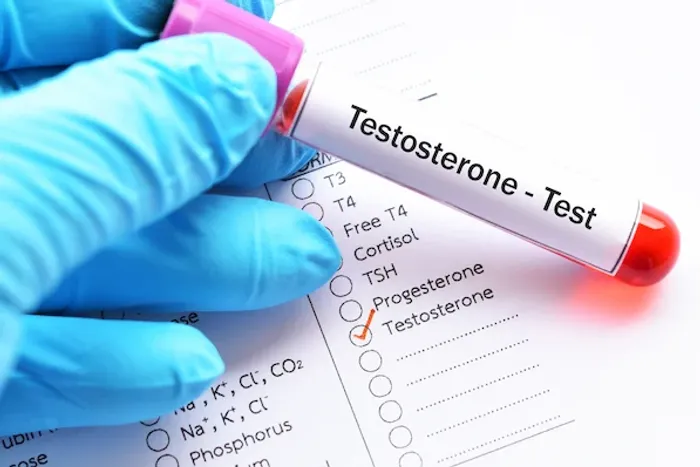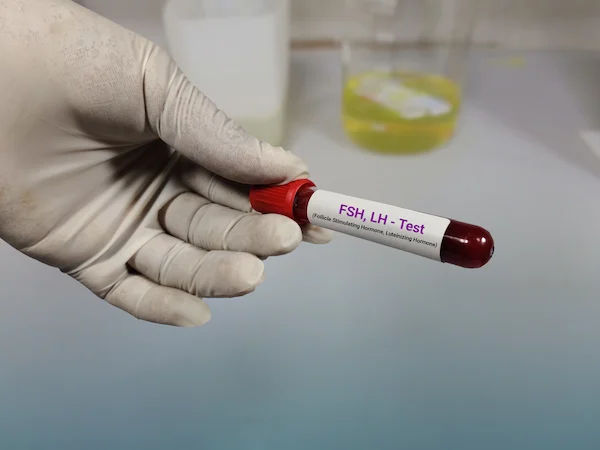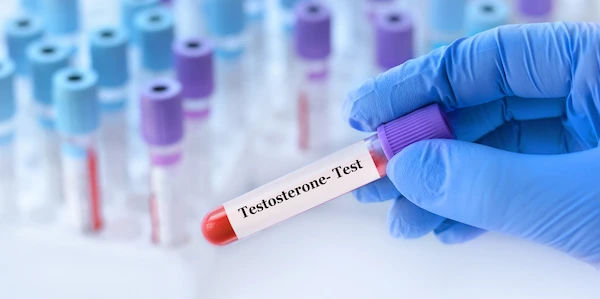What Is the Ideal Testosterone Range for Women?
Testosterone plays a vital role in women’s health, supporting libido, mood, bones, and energy. Discover the normal female testosterone range, what high or low levels may mean, and when to get tested.

Written by
Last updated on 16th Jul, 2025

Testosterone, often perceived as a male hormone, plays a critical and often underestimated role in women's health. While present in much smaller quantities compared to men, it is essential for a wide range of physiological functions in the female body, influencing everything from energy levels and mood to bone density and sexual well-being. For many women, particularly those experiencing symptoms like irregular periods, excessive hair growth, or persistent fatigue, understanding their testosterone levels can be a crucial step towards uncovering underlying health conditions, such as Polycystic Ovary Syndrome (PCOS).
Normal Female Testosterone Levels Explained
Just like other hormones, testosterone needs to be in a just-right balance for women to be healthy. While men have a lot of it, women only need a small amount. Your ovaries and adrenal glands are the main places that make testosterone in your body. It helps with many important things:
- Sex drive and satisfaction: Testosterone is really important for a woman's sex drive and how much she enjoys sex.
- Strong bones: It helps keep your bones strong and healthy, which lowers your risk of a condition called osteoporosis.
- Muscle and strength: Testosterone helps build and maintain your muscles.
- Energy and mood: It affects your energy levels, how lively you feel, and can also play a role in how your mood is regulated.
- Thinking clearly: Newer studies show that testosterone might also be linked to how well you remember things and focus.
Understanding the "normal" range for female testosterone can be somewhat complex, as values can vary based on age, menstrual cycle phase, and the specific laboratory performing the test. Typically, testosterone is measured in nanograms per decilitre (ng/dL) or nanomoles per litre (nmol/L). Total testosterone levels for adult women (19 years and older) are generally considered to be in the range of 0.29 to 1.67 nmol/L (or approximately 8 to 48 ng/dL). Some sources might provide slightly different ranges, so it is always crucial to refer to the specific reference range provided by the laboratory that processed your test.
Get Your Health Assessed
What High or Low Values Might Mean
Fluctuations in testosterone levels, whether too high or too low, can lead to a range of noticeable symptoms and may indicate underlying health conditions.
High Testosterone in Women
Elevated testosterone levels in women, a condition known as hyperandrogenism, can manifest with several distinct symptoms. The most common cause of high testosterone in women is Polycystic Ovary Syndrome (PCOS). Other, less common causes can include adrenal gland disorders or tumours.
Common symptoms of high testosterone in women include:
- Irregular or missed periods: This is very common with PCOS, as high testosterone can mess with ovulation.
- Excess body hair (hirsutism): You might see more coarse, dark hair on your face (chin, upper lip), chest, back, or stomach.
- Acne and oily skin: Higher hormone levels can lead to more breakouts, especially on your face, chest, and back.
- Thinning scalp hair: Some women might experience hair loss on their head, similar to male pattern baldness, even with increased body hair.
- Weight gain: Often around the tummy, this can be linked to insulin resistance, which is common with high testosterone in PCOS.
If you're noticing several of these symptoms, especially irregular periods and excessive hair growth, it's important to talk to your doctor. A testosterone test will likely be part of figuring out what's going on.
Low Testosterone in Women
While often less discussed than high testosterone, low testosterone levels in women can also lead to a range of symptoms that impact quality of life.
Common symptoms of low testosterone in women include:
- Decreased libido (sex drive): This is one of the most frequently reported symptoms of low testosterone.
- Persistent fatigue and low energy levels: A feeling of being constantly tired, even after adequate rest.
- Reduced sense of well-being and mood disturbances: This can manifest as low mood, irritability, or even depression.
- Difficulty concentrating or "brain fog": Cognitive clarity may be impaired.
- Loss of muscle mass and strength: Despite regular exercise, women may find it harder to maintain muscle tone.
- Vaginal dryness: Can contribute to discomfort during sexual activity.
Low testosterone can be a natural part of ageing, particularly after menopause, as ovarian production declines. Other potential causes include certain medical conditions affecting the pituitary or adrenal glands, or the use of some medications like hormonal contraceptives.
When to Check Based on Symptoms
If you are experiencing any of the symptoms mentioned above, particularly if they are persistent or significantly impacting your daily life, it is advisable to discuss them with your General Practitioner (GP) or a gynaecologist. They may recommend a testosterone test as part of a broader diagnostic work-up.
If PCOS is suspected, your doctor will likely look for a combination of symptoms and test results. According to the Rotterdam criteria, a diagnosis of PCOS can be made if you have at least two of the following three features, after other conditions have been ruled out:
- Irregular or absent menstrual periods (indicating infrequent or no ovulation).
- Clinical signs of excess androgens (like hirsutism, acne, hair thinning) or biochemical evidence of high androgen levels (elevated testosterone on blood tests).
- Polycystic ovaries on an ultrasound scan (showing 12 or more follicles in each ovary, 2-9mm in diameter, and/or increased ovarian volume).
A testosterone test is a key component in assessing the second criterion, providing objective evidence of elevated androgen levels.
Using Your Report for PCOS or Fatigue Diagnosis
Getting your testosterone test report can seem confusing with all the numbers. But don't worry, your doctor will look at these results along with your symptoms and health history to get a clear picture.
If your testosterone levels are too high or too low, it gives your doctor important clues.
For PCOS, high total or free testosterone is a key sign, especially if you also have irregular periods, excess hair, or acne. This helps confirm PCOS and rule out other conditions. Your doctor might also check other hormones like LH, FSH, and SHBG for a fuller understanding. Low SHBG is also common in PCOS, meaning more "active" testosterone is available.
If you're dealing with fatigue or low sex drive, a low testosterone result can explain why. Your doctor will then investigate what's causing it, whether it's ageing, menopause, or another health issue. Knowing your levels are low can lead to discussions about solutions like lifestyle changes, diet, or even hormone therapy if needed.
Book Female Hormone Panel at Apollo 24|7
Taking control of your hormonal health begins with accurate diagnostic insights. Apollo 24|7 offers a convenient and reliable way to access essential lab tests, including those specifically designed to assess female hormone levels.
One of the most popular and relevant tests for women concerned about their hormonal balance, including testosterone, is the Apollo PCOD Comprehensive Test. This comprehensive panel assesses a wide range of hormones and metabolic factors commonly associated with Polycystic Ovary Disorder (PCOD) or PCOS, including your testosterone levels.
For a broader overview of your hormonal health, Apollo 24|7 also offers individual hormone tests such as the Testosterone Test, Total which measures your overall testosterone levels. Additionally, the Testosterone - Free Test specifically assesses the active form of testosterone in your bloodstream, providing even more detailed insight.
Advantages of Apollo 24|7 for Lab Tests
Choosing Apollo 24|7 for your lab tests comes with some great perks:
- So Easy to Use: You can book tests online and often have samples collected right at your home. No more travelling or waiting at labs!
- Results You Can Trust: They work with top labs to make sure your results are accurate and reliable for you and your doctor.
- Lots of Test Options: Whether you need a specific hormone check or a full health package, they have a wide range of tests to choose from.
- Quick Reports: You'll get your results fast, so you can discuss them with your doctor and start any necessary treatment sooner.
- Connected Care: Your test results can easily be used by your own doctor. Plus, Apollo 24|7 also offers online doctor consultations if you need them.
- Clear Prices: You'll see exactly what each test costs, so there are no surprises.
Conclusion
Testosterone, though often overshadowed by oestrogen in discussions of female health, is a vital hormone impacting numerous bodily functions. Understanding what constitutes a "normal testosterone level female" and recognising the symptoms of imbalance are crucial steps towards proactive health management. Whether you are experiencing unexplained fatigue, struggling with PCOS symptoms, or simply wish to gain a deeper insight into your hormonal well-being, diagnostic tests provide the objective data needed for informed decisions. By utilising comprehensive diagnostic services, such as those offered by Apollo 24|7, you can gain clarity on your testosterone levels and work collaboratively with your healthcare provider to achieve optimal health.


.webp)

